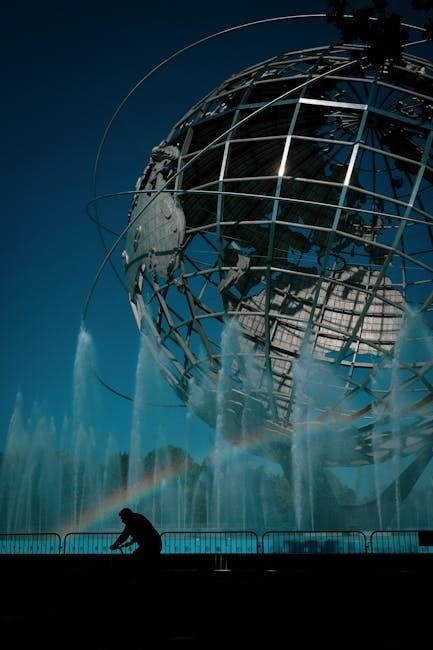
In Strange New World, historian Carl R. Trueman explores the cultural shifts shaping modern identity politics and the sexual revolution, offering a compelling analysis of Western civilization’s transformation.
1.1 Overview of the Book and Its Significance
Strange New World by Carl R. Trueman is a profound exploration of the cultural and intellectual forces shaping modern identity politics and the sexual revolution. This concise yet comprehensive work examines how Enlightenment thinkers, Romanticism, and technological advancements have redefined identity, leading to an era of expressive individualism. Trueman’s analysis is both accessible and deeply insightful, making it an essential resource for understanding the roots of contemporary cultural shifts. The book is particularly significant for its ability to bridge academic rigor with practical application, offering readers a framework to engage critically with these issues. Its relevance extends to both individual and group study, supported by reflection questions that encourage deeper engagement. As a follow-up to Trueman’s earlier work, Strange New World provides a streamlined yet thorough perspective on the interconnectedness of identity, culture, and society, making it a vital read for anyone seeking to navigate the complexities of our modern world. The book’s clarity and depth have earned it praise from scholars and general readers alike, solidifying its place as a key text in discussions about Western civilization’s future. By tracing the historical and philosophical underpinnings of identity politics, Trueman offers a compelling narrative that illuminates the path forward for those grappling with the challenges of expressive individualism. Ultimately, Strange New World serves as a timely and thought-provoking guide for understanding and addressing the cultural transformations of our time, providing a foundation for meaningful dialogue and reflection in both academic and everyday contexts.
1.2 Author Background: Carl R. Trueman

Carl R. Trueman is a renowned historian, scholar, and author specializing in church history and contemporary cultural issues. Holding a PhD from the University of Aberdeen, he serves as a professor of biblical and religious studies at Grove City College. Trueman is also a fellow at the Ethics and Public Policy Center and a contributing editor at First Things. His works, including The Rise and Triumph of the Modern Self and Strange New World, have garnered acclaim for their insightful analysis of Western cultural shifts. His expertise spans historical theology, philosophy, and the intersection of faith and culture, making him a respected voice in both academic and public discourse.

Historical Context: The Evolution of Identity Politics
The evolution of identity politics traces back to Enlightenment ideals of individualism and Romanticism’s emphasis on authenticity, shaping modern notions of self and societal structure.

2.1 The Role of Enlightenment Thinkers
Enlightenment thinkers like René Descartes, Jean-Jacques Rousseau, and John Locke laid the groundwork for modern identity politics. Descartes’ famous assertion, “I think, therefore I am,” emphasized individual consciousness and self-awareness. Rousseau’s focus on human authenticity and emotional truth shifted attention to personal identity. Locke’s belief in the tabula rasa—humans as blank slates shaped by experience—challenged traditional notions of inherent identity. These ideas collectively sowed the seeds for contemporary debates on self-definition and the fluidity of identity, as explored in Strange New World.
2.2 The Influence of Romanticism and Authenticity
In Strange New World, Carl R. Trueman examines how Romanticism’s emphasis on emotion and individual experience shaped modern identity. Reacting against Enlightenment rationalism, Romantic thinkers like Wordsworth and Byron prioritized authenticity and personal expression. This cultural shift elevated the pursuit of self-fulfillment, aligning with the rise of expressive individualism. Trueman argues that Romantic ideals laid the groundwork for contemporary identity politics, where personal authenticity is paramount.

Technological and Cultural Forces
Carl R. Trueman examines how technology and cultural shifts, including the rise of pornography, have reshaped identity and driven the modern focus on self-expression and individualism.
3.1 The Impact of Pornography on Modern Culture
Pornography has profoundly shaped modern culture, distorting perceptions of intimacy and identity. Carl R. Trueman highlights how its pervasive influence contributes to the commodification of sexuality, fostering a culture of instant gratification and isolating individuals from authentic human connection. By redefining intimacy as a self-centered act, pornography erodes traditional notions of relationships and identity, further fueling the rise of expressive individualism. This shift underscores the broader cultural transformation toward self-definition and the erosion of shared moral frameworks.
3.2 The Role of Technology in Shaping Identity
Technology has significantly influenced modern identity, creating virtual spaces for self-expression and reinvention. Social media platforms enable individuals to curate digital personas, often disconnected from their real lives. This digital identity fosters a culture of self-reinvention, where personal narratives are constantly reshaped. Trueman argues that technology not only reflects but also amplifies the shift toward expressive individualism, allowing people to redefine themselves freely. This technological impact accelerates the erosion of traditional identity markers, contributing to the broader transformation of Western culture;
The Decline of Traditional Institutions
The decline of traditional institutions has led to the erosion of religious and family structures, fostering expressive individualism and reshaping cultural norms.
4.1 The Erosion of Religious and Family Structures
The decline of religious and family structures has profoundly shaped modern identity. Religious institutions, once central to moral frameworks, now hold less sway, while family roles blur. This erosion has led to a disconnection from traditional values, fostering self-defined identities. Carl R. Trueman highlights how these shifts have reshaped societal norms, contributing to the rise of expressive individualism and the sexual revolution. The loss of these pillars has left a void, influencing how individuals perceive themselves and their place in society. This transformation underscores the broader cultural changes explored in Strange New World.
4.2 The Rise of Expressive Individualism

Expressive individualism has become a defining feature of modern culture, emphasizing personal autonomy and self-realization. This shift, as explored in Strange New World, reflects the decline of traditional structures and the embrace of fluid, self-defined identities. Social media and technology amplify this trend, allowing individuals to curate personas and express themselves freely. Trueman argues that this cultural transformation, while empowering for some, has also led to a fragmented society, where collective norms are increasingly replaced by personal preference and identity politics. The implications for Western civilization are profound and far-reaching.

The Sexual Revolution and Its Consequences
The sexual revolution, as explored in Strange New World, reshaped societal norms, redefining identity and morality. Its roots in expressive individualism and technological influences have profoundly impacted culture and values.
5.1 Key Figures and Movements
In Strange New World, Carl R. Trueman examines pivotal figures and movements that shaped the sexual revolution, including Simone de Beauvoir, Alfred Kinsey, and the LGBTQ+ rights movement. These individuals and groups challenged traditional norms, advocating for expressive individualism and redefining identity. Beauvoir’s feminist philosophy and Kinsey’s groundbreaking research on sexuality laid the groundwork for radical cultural shifts. The intersection of these movements with technological advancements and societal changes further accelerated the transformation of modern identity politics and sexual expression. Trueman’s analysis highlights the profound impact of these figures on contemporary culture.
5.2 The Intersection of Identity Politics and the Sexual Revolution
In Strange New World, Carl R. Trueman explores how the sexual revolution deeply intertwined with identity politics, reshaping societal norms and personal autonomy. The emphasis on self-definition and sexual freedom became central to modern identity, challenging traditional institutions. Trueman argues that the sexual revolution reinforced the notion of expressive individualism, where personal identity is fluid and self-determined. This intersection has led to a cultural shift, prioritizing personal autonomy over communal and institutional authority, fundamentally altering how individuals and society view human identity and relationships.

Identity Politics in the Modern World
Identity politics now dominates modern discourse, emphasizing self-definition and group identity. This shift reflects expressive individualism and technological influences, reshaping societal norms and cultural values significantly;
6.1 The Shift Toward Self-Definition
The modern world has witnessed a profound shift toward self-definition, where individuals increasingly define their identities based on personal feelings and experiences rather than traditional norms. This change, rooted in Enlightenment ideals and amplified by technology, emphasizes personal authenticity and expressive individualism. Social media platforms have further accelerated this trend, allowing people to curate and project their identities globally. However, this shift has also led to cultural fragmentation and a decline in shared values, raising questions about the stability of societal structures and the future of collective identity.
6.2 The Cultural and Social Implications
The shift toward self-definition has profound cultural and social implications, reshaping how individuals interact and societies function. The rise of identity politics has led to increased polarization, as personal identity often supersedes shared values. Traditional institutions, such as family and religion, have declined in influence, leaving a void filled by expressive individualism. Technology and social media amplify these trends, creating echo chambers that reinforce self-defined identities. This fragmentation challenges social cohesion and raises questions about the long-term stability of Western societies in an increasingly atomized world.

Application and Reflection
Strange New World equips readers with thought-provoking questions and practical steps to engage deeply with the material, fostering personal reflection and cultural awareness in a changing world.
7.1 Thought-Provoking Questions for Readers
Carl R. Trueman’s Strange New World challenges readers with reflective questions, prompting them to consider how identity, autonomy, and cultural shifts impact their beliefs and actions. Questions explore themes like the influence of technology on self-perception, the role of historic thinkers in shaping modern identity, and the tension between expressive individualism and traditional values. These inquiries encourage readers to critically evaluate their own worldview and the broader societal implications of the sexual revolution and identity politics, fostering deeper engagement with the material.
7.2 Practical Steps for Engaging with the Material
- Read the book alongside the Strange New World Study Guide for deeper insights and structured discussion points.
- Participate in small-group discussions to explore the implications of identity politics and expressive individualism.
- Reflect on personal experiences with technology and media to understand their impact on self-perception.
- Engage with the Strange New World Video Study to supplement learning and gain additional perspectives.
- Journal key takeaways and questions to facilitate ongoing reflection and application.
In Strange New World, Carl R. Trueman examines the transformation of Western culture, urging readers to critically engage with identity politics and authenticity in a changing society.
8.1 Summary of Key Themes
Strange New World by Carl R. Trueman examines the cultural and intellectual shifts that redefined identity and sparked the sexual revolution. Trueman traces the influence of Enlightenment thinkers, Romanticism, and technology on modern identity politics. He highlights the decline of traditional institutions and the rise of expressive individualism, linking these changes to the erosion of religious and family structures. The book explores how pornography and technological advancements have shaped contemporary culture, ultimately urging readers to critically engage with the challenges of a rapidly changing world.
8.2 Final Thoughts on the Future of Western Civilization
Strange New World concludes with a sobering reflection on the future of Western civilization. Trueman underscores the profound challenges posed by expressive individualism and the erosion of traditional institutions. He warns that the loss of cultural cohesion and the decline of religious and moral frameworks threaten societal stability. While acknowledging the complexity of these issues, Trueman calls for a renewed engagement with timeless values to navigate the uncertainties of the modern world.